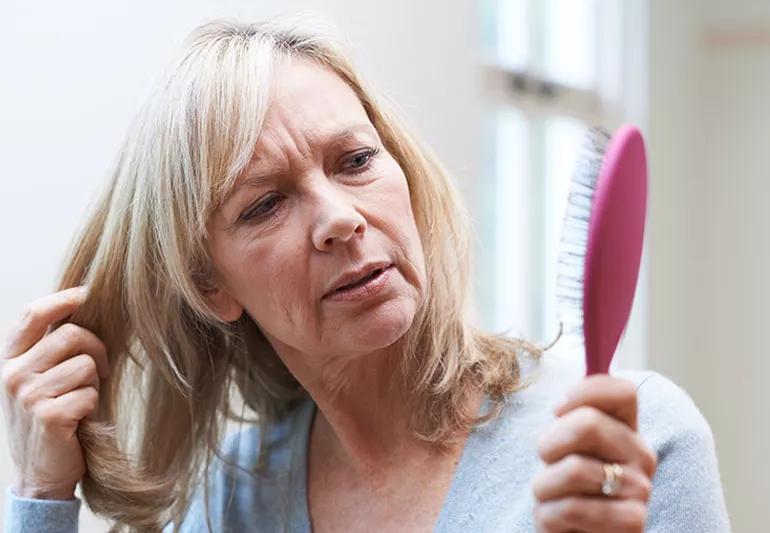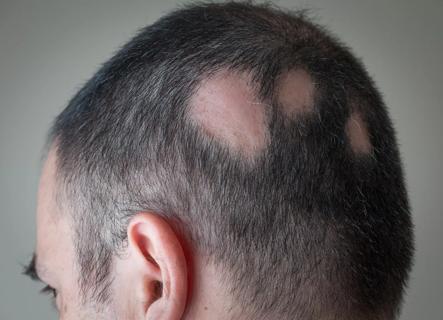Find out what’s causing your hair loss (and what to do about it)

Have you suddenly noticed gobs of hair clogging your hairbrush and shower drain? Or maybe your once-lustrous locks are looking a little sparse. It’s enough to make you want to pull your hair out — if nature wasn’t already doing that for you.
Advertisement
Cleveland Clinic is a non-profit academic medical center. Advertising on our site helps support our mission. We do not endorse non-Cleveland Clinic products or services. Policy
What’s behind your tress distress? We talked to dermatologist Shilpi Khetarpal, MD, to get the scoop on why you’re losing hair (and what to do about it).
Hair shedding is totally normal. But excessive shedding — known in medical terms as telogen effluvium — is often a sign that something’s up.
But it’s a sign that can take time to reveal itself. Hair grows in a cycle. It grows, then rests and finally sheds. At any given moment, each hair on your head is at a different point of that cycle.
That cycle takes time, says Dr. Khetarpal. “So any major shedding you see today is the result of what happened three months ago.”
Several things can cause over-the-top shedding. Here are some of the common culprits.
Stress can trigger telogen effluvium. But it typically takes a major stressor, like divorce or the death of a loved one (a big work deadline or a blind date probably isn’t enough to make your strands say sayonara).
Most women lose a lot of hair a few months after giving birth. Later in life, some women notice extra shedding during menopause. You might also notice shedding if you’re dealing with other hormonal changes, such as stopping birth control pills.
Illness can trigger hair loss, especially if it goes hand-in-hand with a high fever. “Any major shock to the body can cause you to start shedding two or three months later,” Dr. Khetarpal says.
Advertisement
Both hyperthyroid disorder (an overactive thyroid gland) and hypothyroid disorder (a sluggish thyroid) can lead to excessive shedding.
Hair loss can be a side effect of anemia (low iron levels). It can also be caused by shortages of other nutrients, including B vitamins and vitamin D. “Our body needs certain vitamins and nutrients to build hair,” notes Dr. Khetarpal.
Chemotherapy drugs to treat cancer are famous for causing hair loss. But many other common medications can lead to hair loss or thinning, including antibiotics, antidepressants and blood pressure medications.
Excessive shedding is one problem. But true hair loss — known as alopecia — is different. Alopecia causes hair loss over time, which can sometimes be permanent. There are several types of alopecia:
This autoimmune disease develops when your body attacks your hair follicles. It can occur anywhere on the body, including the scalp. Alopecia areata often causes round, patchy areas that are completely hair-free.
Tight hairstyles cause this type of hair loss. It can show up if you wear tight braids or ponytails every day or regularly wear hair extensions or weaves. These styles tug on the hair roots, damaging the hair follicles over time.
Androgenetic alopecia is the most common type of hair loss in both men and women. In males, it’s the cause of familiar male-pattern baldness. But it also occurs in women, more often after menopause.
This hair loss tends to come on gradually. You might notice your part is getting wider or that more of your scalp is poking through your ‘do.
Worried about hair loss? The best thing to do is mention it to your doctor.
Excessive shedding usually stops on its own, especially if it’s caused by stress or fever. But your doctor can check for underlying problems like thyroid disorders or nutrient deficiencies. Treating those problems will reverse the hair loss.
Treatments can help excessive shedding and alopecia. Some options include:
“It’s important to have a discussion with your doctor to find the right treatment,” says Dr. Khetarpal. And in the case of alopecia, the sooner you start, the better. “The longer the hair is gone, the harder it is to get back,” she says.
Advertisement
Learn more about our editorial process.
Advertisement

Take steps to reduce stress by practicing meditation, finding time to relax and maintaining a healthy lifestyle

You may see pitting, brittleness or ridges in your fingernails and toenails

Your immune system may attack hair follicles anywhere on your body

It’s normal to lose around 50 to 150 strands per day to routine hair shedding

Studies are mixed, but frequently wearing very tight, warm hats could stress your follicles and lead to hair loss

Things like stress, heated styling and other health conditions may cause you to lose more hair than normal

Creatine does cause some side effects, but hair loss probably isn’t one of them

A gentle hair care routine, stress reduction and sun protection can help reduce flares and maintain your locks

Wearing a scarf, adjusting your outdoor activities and following your asthma treatment plan can help limit breathing problems

Your diet in the weeks, days and hours ahead of your race can power you to the finish line

When someone guilt trips you, they’re using emotionally manipulative behavior to try to get you to act a certain way